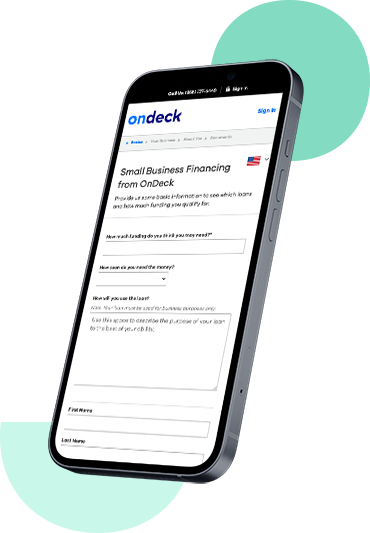
What is a merchant cash advance?
A merchant cash advance (MCA) provides small business owners access to working capital based on their future sales — most commonly debit and credit card sales. The business receives a lump sum of money, and in exchange, the MCA provider receives some of the business’s future revenue at a discount.
Merchant cash advances aren’t a loan — the same rules, regulations and requirements do not necessarily apply. MCAs can be appealing to some businesses because they provide quick funding and have more lenient qualification requirements (it’s possible to get approved even with bad credit).
OnDeck does not offer a merchant cash advance. Instead, we offer a line of credit and a business term loan. Our products are quick and easy to apply for, and you can receive the funds you need fast.

How do merchant cash advances work?
With an MCA you’ll be given a lump sum payment upfront in exchange for a percentage of your future receivables. The provider is essentially buying a portion of your future sales at a discounted rate.
Because merchant cash advances are not loans, they don’t have an APR or interest rate. Instead, they have a factor rate. A factor rate is typically expressed as a decimal number between 1.2 and 1.5. A rate of 1.2 would indicate the business needs to repay 100% of the advance amount plus an additional 20%. A factor rate of 1.5 indicates an additional 50% needs to be repaid on top of the full funding amount.
There are two ways an MCA is typically repaid: as a percentage of your debit and credit card transactions, or as fixed withdrawals from your business bank account. The percentage method may refer to the percentage as a holdback rate — or just “the holdback”. That holdback will be drawn from your account automatically over a specific repayment period. This can be beneficial for businesses that want their repayment amounts to align with the amount of sales they are making.
The fixed repayment method may be structured similarly to the repayment of a traditional small business loan. You follow a daily or weekly repayment schedule of a fixed payment amount regardless of how much you’ve made in sales. In this situation, the fixed payment amount is based on your business’s estimated monthly revenue.
Business Cash Advance vs. Merchant Cash Advance
The term “business cash advance” (BCA) is sometimes used to describe a merchant cash advance. A business cash advance generally refers to when the advance is repaid with fixed daily or weekly payments. A merchant cash advance typically refers to when the funds are repaid via a holdback of your business’s future credit or debit card sales.
Consider an alternative to a merchant cash advance.
Merchant cash advances are just one of many financing options small businesses look for when they need extra capital. They may consider business credit cards, equipment financing, SBA loans, invoice factoring, lines of credit or a traditional business loan. OnDeck offers both a business line of credit and a business term loan, and your application details will determine whether you’re eligible for either type of financing — or both.
OnDeck Line of Credit
A revolving credit line you can draw from 24/7 to receive funds within seconds.*
- Credit limits from $6K - $200K
- Flexible repayment terms of 12, 18 or 24 months
- Great for keeping funds on hand
OnDeck Term Loan
A one-time lump sum of cash with an eventual option to apply for more.
- Loan amounts from $5K - $250K
- Repayment terms up to 24 months
- Great for larger investments in your business
OnDeck Minimum Requirements**
1 Year
in business
Business
checking account
$100K
business annual revenue
625
personal FICO® score
Fast, easy and reliable funding for all your business needs.
-
Step 1
Complete the application.
Our streamlined application process is designed to be completed in just minutes.
-
Step 2
Get a decision.
Work with an expert loan advisor to discuss eligibility and choose the best funding option for you.
-
Step 3
Receive your funds.
Sign your contract and get funds sent to your bank account as soon as the same day.†

FAQs: Merchant Cash Advance
Before you apply for any type of business financing, you’ll want to understand the pros and cons. Consider the following when considering a merchant cash advance:
Pros
Quick access to funds. Merchant cash advance companies typically allow for an expedited approval process and fast funding times.
Flexible repayment. Payments are generally based on a percentage of daily sales, making them more adaptable to business revenue fluctuations. You may also have the option to repay fixed amounts on a daily or weekly basis.
May be easier to qualify for. Businesses with lower credit scores or limited collateral may find it easier to qualify compared to traditional loans.
Cons
High cost. MCAs often have higher fees and factor rates, making them more expensive than conventional financing options.
Impact to cash flow. Since repayment is generally tied to daily sales, businesses may experience tighter cash flow, especially during slow periods.
Lack of regulatory protections. Unlike traditional loans, MCAs may not be subject to the same laws as traditional business loans, which may lead to less favorable terms.
No boost to business credit. Because an MCA is not a loan, it won’t affect your business credit score or help you build business credit history. However if you default on your MCA, it could be sent to a collections agency. Unpaid debt collection accounts generally get reported to major credit bureaus.
A loan and a merchant cash advance are both a form of financing for businesses, but they work differently.
Small business loan. A traditional business loan provides a lump sum of money that is repaid over a period of time with fixed payments, typically including interest. Loans often require credit checks, a form of collateral and sometimes a lengthy approval process.
Cash advance. A cash advance for a business is known as a merchant cash advance (MCA). These are not loans, but rather an advance against future sales. The lender provides upfront funding in exchange for a percentage of daily credit card or debit card sales until the full amount (plus any fees) is repaid. MCAs have more flexible repayment terms but can be more expensive than traditional loans.
MCA providers generally look at daily credit and debit card receipts to determine if you can pay back the advance in a timely manner. All lenders — including merchant cash advance providers — typically require you to meet some minimum requirements. These providers have different qualification standards than credit lenders. As a result, the cost of an MCA can be much higher than traditional credit lenders. Make sure you understand the terms you’re being offered so you can make an informed decision about whether or not a merchant cash advance makes sense.
The MCA holdback is the percentage of daily credit or debit card sales that a merchant cash advance provider deducts to repay the advance. This percentage is agreed upon during the funding process and remains consistent until the advance is repaid in full. Unlike fixed loan payments, the amount deducted fluctuates based on sales volume, making repayments more manageable during slower periods.
A holdback rate is the percentage of future credit card sales that will be taken by the merchant cash advance provider. This money will be used to pay off the total amount of your advance. But the total cost of your advance will be directly impacted by your factor rate, which is the MCA version of an interest rate.
Unlike the interest rate or annual percentage rate charged on a term loan, a factor rate doesn’t amortize over the course of repayment. Factor rates are also usually expressed as a decimal instead of a percentage.
Say you’re approved for an MCA with a factor rate of 1.5. You’re essentially paying the provider $1.50 for every dollar you’ve been advanced ($100,000 x 1.5 = $150,000). With this simple calculation, you may be able to calculate the total cost of the MCA.
A merchant cash advance is one option if you need cash quickly and aren’t able to secure other forms of credit. However, it’s critical to make sure that the costs of the MCA make financial sense for your business. Because they’re typically easy to obtain, they often come with a premium cost and can cause cash flow problems down the road.
Defaulting on an MCA can have serious financial consequences, including:
Aggressive collection efforts. MCA providers may attempt to recover funds through daily withdrawals, legal action, or placing a lien on business assets.
Higher fees and penalties. Defaulting could trigger additional fees, if authorized by the contract you signed, increasing the total amount owed.
Personal financial risk. MCA agreements may include a personal guarantee. So a business owner could be held liable for the debt if the business fails to repay.
Legal repercussions. Some MCA agreements include a confession of judgment, allowing the lender to take legal action against the business without a court trial, if allowed under the laws of the specific state.
Credit and business impact. While MCAs don’t always report to credit bureaus, defaulting could still damage your business reputation and ability to secure future small business financing.
If a business is struggling with MCA payments, it’s best to communicate with the provider early and explore restructuring your payment options.
A small business cash advance is a type of financing where a business receives an upfront sum of money in exchange for a portion of its future revenue. These advances are often structured as merchant cash advances, where repayment is based on daily sales. Small business cash advances are commonly used for:
- Covering short-term expenses.
- Managing cash flow fluctuations.
- Purchasing inventory or equipment.
- Expanding operations.
Unlike traditional loans, small business cash advances typically have faster approval processes and more flexible qualification requirements than traditional bank loans, but they can come with higher costs.